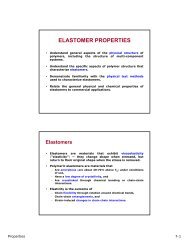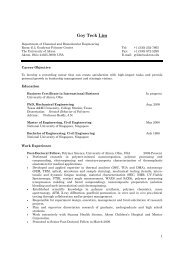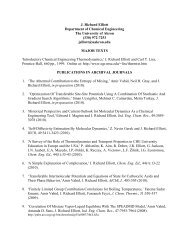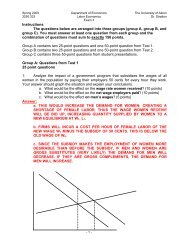Sociology of the Anarchists - Gozips.uakron.edu - The University of ...
Sociology of the Anarchists - Gozips.uakron.edu - The University of ...
Sociology of the Anarchists - Gozips.uakron.edu - The University of ...
Create successful ePaper yourself
Turn your PDF publications into a flip-book with our unique Google optimized e-Paper software.
with much <strong>of</strong> this thinking, particularly that conventional social structures are coercive.<br />
Out <strong>of</strong> <strong>the</strong> consensus that <strong>the</strong>re are things such as racism and sexism in society, this is<br />
logical. However, <strong>the</strong>re has been acknowledgment from some sectors <strong>of</strong> anarchism that<br />
say that <strong>the</strong>se cultural oppressions have somehow usurped class oppression, to <strong>the</strong> point<br />
that it is easier to gain support over issues <strong>of</strong> racial and gender discrimination than it is<br />
for issues <strong>of</strong> class oppression... a sentiment that would seem apparent in contemporary<br />
conflict <strong>the</strong>ory. Lastly, anarchists agree that political and economic authorities are usually<br />
different people and organizations, but would disagree that <strong>the</strong>y do not have a symbiotic<br />
relationship most <strong>of</strong> <strong>the</strong> time. <strong>The</strong> capitalist State functions in-tandem fashion with many<br />
forms <strong>of</strong> authority; whe<strong>the</strong>r <strong>the</strong>y are truly independent (and at what level) is questionable.<br />
<strong>The</strong> classic study <strong>of</strong> <strong>the</strong> American elite, done by C. Wright Mills in <strong>The</strong> Power Elite<br />
(1956) showed <strong>the</strong> “cohesive interpersonal network composed <strong>of</strong> top leaders in business,<br />
<strong>the</strong> federal executive branch <strong>of</strong> <strong>the</strong> government, and <strong>the</strong> military, who successfully<br />
controlled key national decisions” (Moore, et al. 2002, p. 726). In Moore's recent study, it<br />
was discovered that <strong>the</strong>re was also a sizable connection with major nonpr<strong>of</strong>it<br />
organizations to this elite network.<br />
Dahrendorf argued in Class and Class Conflict in Modern Societies (1959) that Marx's<br />
assumption <strong>of</strong> class deriving from property was only partially correct. He states that<br />
authority actually supersedes property in power—an incredibly anarchist idea. Of course,<br />
economic power can be derived from property, but that property is attained and retained<br />
through <strong>the</strong> authority <strong>of</strong> economic laws and <strong>the</strong> State. Authority indicates control more<br />
surely than property does. Dahrendorf's definition <strong>of</strong> authority (<strong>the</strong> probability that a<br />
command will be obeyed) hinges upon <strong>the</strong> legitimacy given to <strong>the</strong> authority. From an<br />
anarchist standpoint, even though power may still exist, <strong>the</strong> authority <strong>of</strong><br />
someone/organization can be simply revoked by refusing to respect its position <strong>of</strong><br />
legitimacy. Thus, <strong>the</strong>y/it can still force someone's actions, but <strong>the</strong> command itself is not<br />
being respected (<strong>the</strong>refore authority is lost).<br />
Thus in modern society, most conflict plays itself out in organizations, primarily<br />
bureaucracies (intensely hierarchical organizations where orders flow from those above to<br />
those below). In any given conflict, <strong>the</strong>re are order-givers and order-takers (in this sense<br />
Dahrendorf is r<strong>edu</strong>cing class struggle to a binary conception, like Marx). 18 <strong>The</strong>se two<br />
groups have latent interests that become manifest, i.e. class consciousness. Unlike Marx,<br />
Dahrendorf did not believe that manifest interests was inevitable, and that certain things<br />
could enhance or impede <strong>the</strong> process <strong>of</strong> interest group formation (groups that act upon<br />
<strong>the</strong>ir interests in a class-conscious manner). <strong>Anarchists</strong> have historically approached <strong>the</strong><br />
question <strong>of</strong> “manifestation” differently than Marxists. Lenin specifically advocated a<br />
vanguard that would lead <strong>the</strong> people into revolution, while anarchists claim that only <strong>the</strong><br />
people can lead <strong>the</strong>mselves in to revolution. Any o<strong>the</strong>r process would be a subversion <strong>of</strong><br />
goals and needs by anarchist “leaders”, divorced from <strong>the</strong> people/workers/proletariat<br />
<strong>the</strong>mselves.<br />
18 Semantically, <strong>the</strong> word “order” is here more synonymous with “command” ra<strong>the</strong>r than with<br />
“organization”. <strong>Anarchists</strong> are frequently libeled as being pro-disorder. <strong>The</strong>y are, in fact, usually<br />
opposed to disorder and are pro-order, just not a hierarchical form <strong>of</strong> social organization.<br />
[ Williams 19 ] [ this is a draft. do not cite. ]






